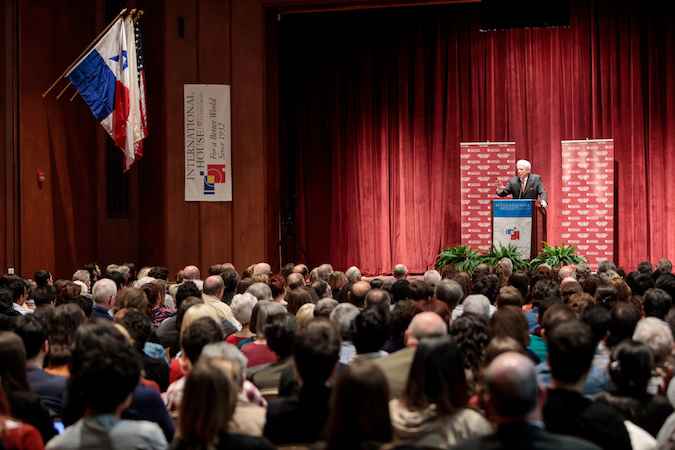Nobel Laureate Mario Vargas Llosa Delivers Berlin Family Lectures

This article originally appeared in UChicago News on 10 May, 2017.
As a young boy in Peru, Mario Vargas Llosa devoured the works of Jules Verne and Alexander Dumas, dreaming of becoming a writer himself. Fearing his son might actually attempt such a career, Vargas Llosa’s father sent him to a military school in Lima in the hopes of “curing” him of his literary ambitions.
Far from a deterrent, the “two years gave me the raw material for my first novel [The Time of the Hero],” Vargas Llosa said on April 24, during the first in a series of four Berlin Family Lectures.
Established in 2013, the Randy L. and Melvin R. Berlin Family Lectures aim “to bring to campus individuals making fundamental contributions to the arts, humanities and humanistic social sciences,” said Anne Walters Robertson, dean of the Division of the Humanities, during her introduction of Vargas Llosa.
"We invite scholars who are intellectually active, who continue to create, continue to work and continue to think deeply about fundamental issues of common concern," Robertson said.
The theme of the lectures is “The Writer and His Demons,” and Vargas Llosa offers an account of the creative process behind four of his novels. Each reveals the diverse themes covered over a nearly seven-decade long career.
In addition to 19 novels, Vargas Llosa is an accomplished, essayist, journalist, playwright and even politician, running for the Peruvian presidency in 1990. The Nobel committee honored him in 2010 “for his cartography of structures of power and his trenchant images of the individual's resistance, revolt and defeat.”
“He is a very important Latin American writer,” said Thomas Pavel, the Gordon J. Laing Distinguished Service Professor in Romance Languages and Literatures, who introduced Vargas Llosa at the second lecture. “He’s one of the Latin American writers who chose to be a realist, to be closer to the understanding and representation of life and political conflicts.”
Vargas Llosa chose to break from the traditional style of “magical realism” associated with his contemporaries, including Gabriel Garcia Marquez and Jorge Luis Borges, thanks in large part to his time at military school. Vargas Llosa called his time at the school his “great adventure” and credits it with opening his eyes to the enormous inequalities facing Peru that he was unaware of growing up in an upper-middle-class family.
"I wasn't happy there, but I am very grateful to my father for having sent me...because I discovered the real Peru," Vargas Llosa said.
In addition to The Time of the Hero, Vargas Llosa will discuss Conversation in the Cathedral, The War of the End of the Worldand The Feast of the Goat. All the lectures will be available on the Division of the Humanities’ YouTube channel and the Berlin Family Lectures website.
On May 15, the final lecture will feature a Q&A with Vargas Llosa with questions collected from audience members over the course of the lecture series. Victoria Saramago, assistant professor in Romance Languages and Literatures, will lead the discussion.
“It is a unique opportunity to listen to one of the greatest writers of the 20th and 21st centuries,” Saramago said.